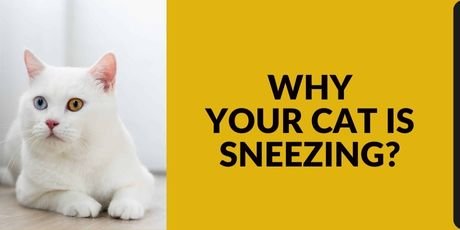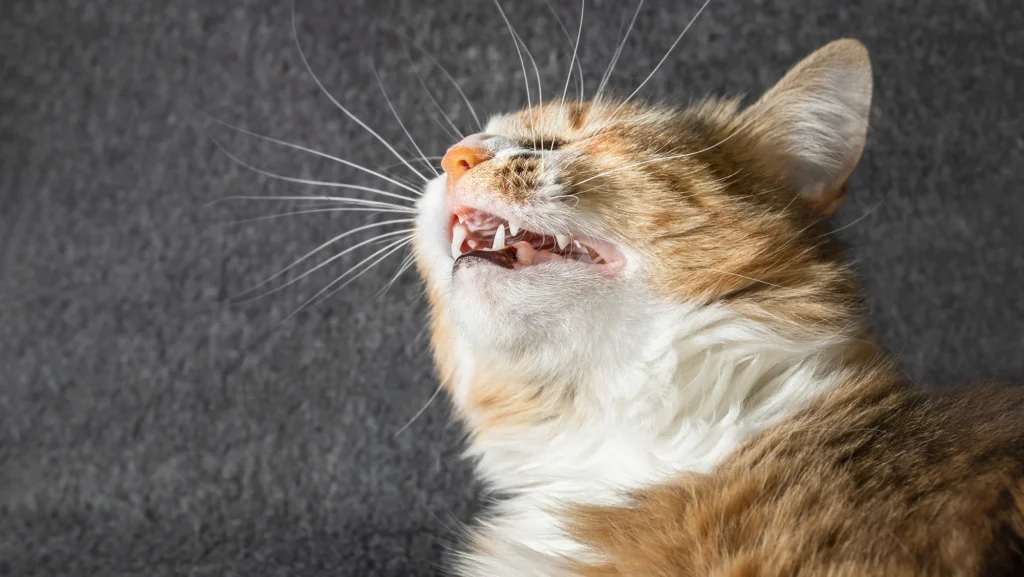In my experience with feline companions, it’s not uncommon to witness an occasional sneeze. Understanding that a cat sneezing now and then is normal and usually no real cause for alarm is crucial. Similar to humans, a sneeze in cats is an explosive release of air from the nose and mouth. This act is a body’s response to irritants in the nasal passages. Whether it’s a dust particle or a playful movement that stirs up excitement, these are everyday occurrences that can prompt a sneeze.
However, if your cat’s sneezing won’t go away or if other symptoms have cropped up, it’s prudent to check with a veterinarian. Persistent sneezing might require treatment, especially if it’s part of a broader pattern of symptoms. My own cat once had a sneezing bout that didn’t cease, leading us to seek veterinary advice. It turned out to be a minor issue, but it was a relief to have professional confirmation.
Causes of Sneezing
When your cat starts sneezing frequently, it’s sensible to suspect a specific cause. A review of the symptoms with a veterinarian can help identify the main causes. Often, an infection is suspected in such cases, and your vet might take a swab from the mouth, throat, eyes, or nose to send to a lab for analysis to confirm the diagnosis. Besides infections, inhaled irritants and allergens are also common causes of sneezing in cats. My cat once had a sneezing spell that led us to discover her sensitivity to certain household dust.

Viral, Bacterial, or Fungal Infections
When your sneezing cat exhibits symptoms, there are high chances it might be suffering from an upper respiratory infection. Much like colds in humans, these infections are common, especially in young cats or those in animal shelters. They can often be prevented with early and complete vaccinations.
To accurately distinguish between viral infections, bacterial infections, or something more unusual like Cryptococcus, a physical exam is crucial. In cases of persistent cat sneezing, procedures like rhinoscopy or a biopsy may be needed for a definitive diagnosis. My cat once had to undergo these tests, which thankfully helped in pinpointing the exact cause of her discomfort.
Viral infections that most commonly cause sneezing in cats are:
Feline Herpes Virus
Cats can catch the Feline herpes virus through exposure to other cats that are infected. This virus is a common cause of sneezing in cats. Factors like Stress can cause a flare-up of the virus, although it’s important to note that Feline herpes virus is NOT contagious to humans. Treatment focuses on controlling the symptoms rather than curing the virus itself.
Feline Calicivirus
The Feline calicivirus, a highly contagious virus among cats. It often leads to Mouth ulcers and is a common problem that can affect the respiratory tract, sometimes even causing pneumonia. Cats infected with calicivirus are likely to develop respiratory problems and experience exacerbated sneezing. In cases where herpes leads to a secondary bacterial infection, it’s typically treatable with antibiotics.
Also Read: Why is My Cat Crying?
A wide range of other infections may also lead to sneezing. They include:
A wide range of infections can lead to sneezing in cats. Feline infectious peritonitis might present with no symptoms, mild symptoms, or severe symptoms that develop over time. Feline Immunodeficiency Virus (FIV) develops slowly but significantly impacts the cat’s immune system, making them more vulnerable to other health issues. Feline leukemia is another serious, and often fatal condition to be aware of. Chlamydia in cats, typically causing an eye infection like conjunctivitis, and respiratory pathogens like Bordetella and Mycoplasma are also known to trigger sneezing.
Inhaled Irritants or Allergens
When a cat sneezes once in a while, it’s often due to irritating substances in their nasal passages. It’s helpful to look for patterns in the sneezing – does it occur more frequently around lit candles at the dinner table or just after the leaves in the litter box are cleaned? These could be potential irritants or allergens, substances that cause allergic reactions in sensitive cats.
- Cigarette smoke
- Perfume
- Pest sprays
- Cat litter, especially types that create dust
- Cleaning agents
- Candles
- Dust
- Pollen
- Mold
Other Potential Causes of Sneezing
Among the potential causes of sneezing in cats, a variety of factors can contribute. Some cats experience sneezing within four to seven days of receiving an intranasal vaccine, which typically lasts for several days. Sneezing can also help to dislodge a blockage in their nasal passages. Other times, it might indicate an infection or inflammation around a tooth root, affecting the drainage of their sinuses. In rare cases, persistent sneezing can be a sign of cancer in cats.
Why Cats Sneeze: Causes, Symptoms and Treatments
Cats sneeze for various reasons, and while it can be a cause for concern, it’s a common occurrence in our feline friends. Just like humans, cats can get a cold or suffer from upper respiratory infections (URI’s) and sinus infections, conditions that often manifest in sneezes.
Sneezing is an involuntary bodily reflex to expel irritants from the upper nasal passage and clear out the respiratory tract. It involves blowing air forcefully from the lungs through the nose and mouth, a phenomenon seen across the animal kingdom, from our family dog to pet chickens and even elephants.
Common Causes of Why Cats Sneeze
-
External Irritation
Cats’ sneezing is often a reaction to external irritation from various irritants. Their sensitive noses can detect noxious smells and chemicals, turning everyday household products into potential toxins. Rat poison, for instance, may trigger sneezing despite being out of sight.
Cooking spices: In my kitchen, I’ve observed how cooking spices like pepper and cinnamon affect my cat. These sources of rich aromas for humans are overpowering for a cat’s sensitive nose. Their curious nature often leads them into the kitchen, where these spices can cause sneezing.
Household cleaning products: Interestingly, household cleaning products, including bleach and vinegar, are major sneeze triggers. These chemicals we use for cleanliness can unintentionally cause discomfort to our cats.
Essential oils: Lastly, while essential oils may enhance our mood and living experience, they can distress our cats. The acute sense of smell in cats makes them vulnerable to these oils, often leading to a sneezing fit.
-
Foreign Material
Curious cats get all sorts of foreign material lodged in their noses.
- Objects like lint, grass or a hair.
- Airborne bodies such as pollen, or other allergens.
- Dust and other airborne particles such as smoke.
Cats often sneeze to expel debris that gets lodged in their nasal passages. Particles inhaled during their explorations can trigger this natural reaction.
Veterinary Clinic Appointments
In cases where sneezing persists, it might be a sign to make an appointment at the veterinary clinic. As an animal caretaker, it’s crucial to ensure they’re not suffering from anything serious.
-
Upper Respiratory Infections (URIs)
Upper Respiratory Infections (URIs), particularly Feline Herpesvirus (FHV), are a common reason for sneezing in cats. It’s normal for a feline friend to be infected with this widespread respiratory infection. Emerging research shows that many cats, especially kittens, have been exposed to FHV, becoming chronic carriers of the virus. When stressed or immunosuppressed, the dormant virus can re-emerge, causing viral symptoms. While there’s no cure for herpesvirus, certain medications can improve the results and manage this lifelong infection.
Common symptoms of upper respiratory infection (URI) in cats include:
- Repeated sneezing over several hours or days
- An appearance of irregular discharge (yellow, green or bloody) from the nose or eyes
- Recurrent coughing or swallowing
- Lethargy and/or fever
- Dehydration and/or decreased appetite; weight loss
- Diarrhea
- Enlarged lymph nodes
-
Dental Disease
Dental disease in cats can often manifest as sneezing. According to the Pet Health Network, root infections in a feline tooth can cause bacteria to spread to the nasal sinus, leading to inflammation.
For many pet parents, this sneezing may seem harmless but can actually contribute to a symptom of a larger issue. Infections in teeth of the upper jaw can extend to nasal passages. If a tooth hole in the wall of the nasal passage is breached and left untreated, the infection can travel throughout the body.
-
Neoplasia
When it comes to neoplasia, tumors can cause sneezing symptoms in older cats. These aberrant cancer cells in the nasal passage result in irritation and inflammation. A cat may sneeze repeatedly if such growths are detected. Tools like rhinoscopy and a nasal biopsy are essential for diagnosis. It’s important to recognize these signs early, as they can lead to poor outcomes if not addressed promptly.
Also Read: Why is My Cat Growling?
My Cat is Sneezing More than Usual. What Should I Do?
If your cat is sneezing more than usual, start by studying your cat’s environment for potential causes. Notice patterns; is the sneezing triggered by a specific irritant, like dust, perfume, or an infection? Could it be an underlying condition? Monitor the time of day, specific rooms, and household activities. Check if the cat litter is too dusty or scented. Be aware of products in your home like cleaners, candles, or scented oils. Regular cleaning can reduce dust and pollen. For upper respiratory infection signs, such as discharge from the nose or face, gently wipe with a warm, moistened cotton or clean cloth. Encourage them to eat, possibly warming up canned, wet food, to aid digestion and provide fresh water. A humidifier can help keep their nasal passages moist. If the sneezing persists despite addressing environmental causes, schedule a veterinary appointment.
When is it Time to See My Veterinarian?
If your cat sneezes every once in a while and the symptoms seem mild, it’s usually safe to monitor them for a few days. As a precaution, especially if your cat is indoors, watch for any changes in their behavior or health.
However, if the sneezing is excessive or accompanied by other serious signs, it may require an immediate vet visit. Persistent or severe symptoms are a clear indicator that professional help is needed.
- Loss of appetite
- Weight loss
- Nasal discharge
- Worsening of symptoms
- Persistence of symptoms beyond a few days
Treatment of Upper Respiratory Infections in Cats
Treatment for a feline excessively sneezing due to an upper respiratory infection must be targeted at the underlying cause. Once the culprit emerges, a variety of treatments are available. Owners should be aware that the goal in chronic cases is to reduce the frequency and severity of symptoms, rather than seeking a complete cure. The severity of the condition will determine the response. In cases with mild symptoms, URIs may resolve on their own in a couple of weeks, aided by simpler solutions.
Treatments for mild cases:
- Humidifiers or vaporizers
- Antihistamines and decongestants
- NSAIDs
- Antinausea medications
- Eye and/or nose drops
For more progressive cases, treatments options may include:
Antiviral medications or antibiotics: Antiviral medications or antibiotics are effective for bacterial infections, though they are rarely the primary issue, they help your kitty feel better, faster.
Nasal Lavage: Nasal Lavage can be used to clear the nasal passages under general anesthesia to temporarily ease symptoms and dislodge hidden foreign material.
Steroids: Subcutaneous fluids (to alleviate dehydration). Administering subcutaneous fluids is vital to alleviate dehydration in cats.
Surgery (in extreme cases): Upper respiratory infections in cats, if untreated, can lead to serious complications like pneumonia or chronic breathing issues. Advanced cases may require hospitalization to administer intensive treatments, including IV fluids and nutritional support.

Reasons Why Your Cat Is Sneezing
Reasons, Cat, Sneezing, noticed, occasionally, wondered, causing, good news, most cases, sneeze, symptom, worse problem, find out, reading, animal hospital, article.
-
Nose tickle
A simple nose tickle can be why your cat sneezes a few times. These symptoms are often just a tickle caused by dust, pollen, or even their own fur, and are usually not serious.
-
Cancer
In rare cases, sneezing in cats can be a symptom of cancer. While not common, it’s a symptom to look out for.
- Unexplained weight loss
- Lack or loss of appetite
- Vomiting
- Diarrhea
- Lumps
- Lethargy
- Unexplained bleeding
- Wounds don’t heal
Varied kinds of causes, including Feline Leukemia Virus (FeLV), may be involved, but luckily, this is uncommon.
Also Read: How to Cure Heat Stroke in Cats?
What is Cat Sneezing?
Cat sneezing is an explosive expulsion of air from the mouth and nose, often in a shower of discharge that can be clear, bloodstained, or yellow/green if there’s an infection. While usually a minor occurrence to expel an irritant, repeated sneezing accompanied by other symptoms like excessive discharge from the nose or eyes, coughing, wheezing, reduced appetite, or fatigue, can indicate a bigger health issue in a sneezing cat.
Why Does My Indoor Cat Keep Sneezing?
Your indoor cat sneezing could be a sign of an upper respiratory infection, resembling a cold or cat flu. These infections can be contracted without ever going outside, often through indirect meeting with other cats. Viral particles can travel into your house via clothes, shoes, or other belongings.
If you notice your cat sneezing often, it’s essential to contact a trusted vet as soon as possible to discuss appropriate treatments. While causes for sneezing can be less common, the primary suspects are often related to an infection.
When in contact with cats from feline colonies or cat shelters with unknown immunity, and if you observe any respiratory signs, it’s advisable to thoroughly wash your hands and change your clothes after returning home, to protect your own cats.
Why Does My Kitten Keep Sneezing?
If your kitten sneezes only occasionally, it’s generally not a concern. However, if it persists, it’s wise to contact a vet. Common reasons could be odd smells from cleaning products, cooking with spicy or pungent food, or environmental factors like dust, pollen, perfume, and cigarette smoke. Unlike adult cats, kittens can show infection symptoms more rapidly.
Why is My Elderly Cat Sneezing?
Sneezing in an elderly cat can cause more worry as our feline friends become more susceptible to infection with age. Increased prevalence of tumours in older cats also warrants veterinary attention when sneezing is observed.
Conclusion
Sneezing in cats, while often a benign and natural response to irritants, can sometimes be a window into deeper health issues. From simple nose tickles caused by dust to more serious conditions like upper respiratory infections, allergies, or even neoplasia, the reasons for a cat’s sneeze are varied. The key takeaway for cat owners is to observe and understand the context of their pet’s sneezing. While occasional sneezes are usually harmless, persistent or accompanied symptoms should prompt a veterinary visit. Proactive care, combined with an awareness of potential environmental irritants, can ensure our feline companions lead comfortable, healthy lives. Remember, each sneeze tells a story; it’s our responsibility as pet owners to listen and react appropriately.
People Are Also Interested In:
When should I worry about my cat sneezing?
As someone who keeps their cat mostly indoors, I tend to watch for any changes in their health. If your cat is sneezing continuously or more often than usual, it’s a sign to call the vet. Particularly concerning are signs like blood in the sneeze or other symptoms of illness. These could indicate a more serious condition requiring veterinary care and treatment. It’s always better to be cautious when it comes to understanding the cause of your cat’s sneezing.
How can I help my sneezing cat?
As a cat owner, I’ve learned the importance of maintaining a clean and free of dust particles living area. Cats, with their delicate nasal and throat passages, can easily have these areas irritated by foreign matter. One effective method I’ve found to reduce their sneezing is using a humidifier or vaporizer. This adds moisture to the air, helping alleviate any aggravation in their respiratory tract. Additionally, letting your cat sit in a bathroom filled with steam from a hot shower can help them breathe more easily. It’s a simple yet effective remedy that has worked wonders for my furry friend.
Also Read: How to Help Cats with a Sensitive Stomach?
How can I treat my cats cold at home?
Dealing with a cat with a cold requires a bit of home care. Increasing humidity in your house can significantly help. I’ve used both a humidifier and a vaporizer to ease my cat’s stuffy nose. Additionally, using a warm, damp cloth to gently wipe their nose helps to cleanse and soothe it. For watery eyes, a homemade saline solution applied with gauze pads can be quite effective.
How long do cat colds last?
In my experience, cat colds are usually harmless and tend to resolve within 1-2 weeks. However, it’s crucial to monitor their health closely. If by the fourth day there’s no improvement, or symptoms seem to be persisting, it’s advisable to make an appointment with the vet. While most cat colds are benign, they can sometimes lead to more serious conditions like pneumonia if not properly treated.







